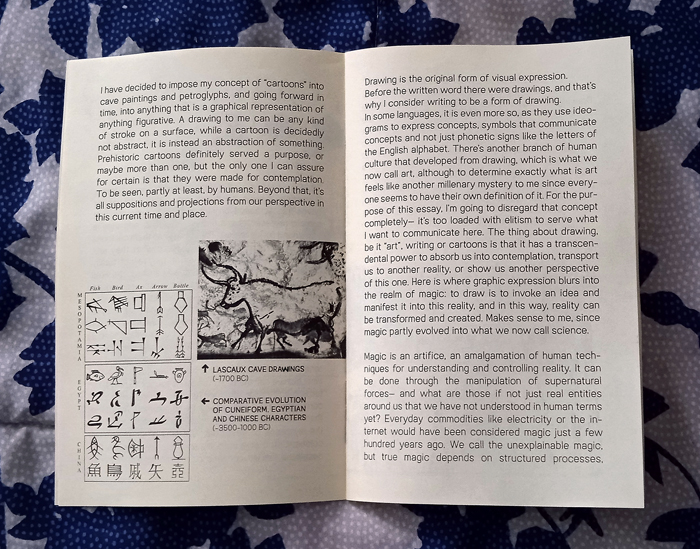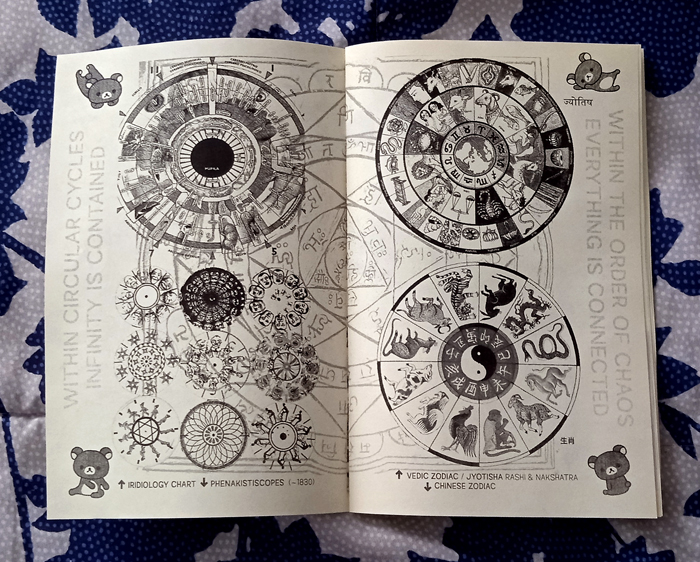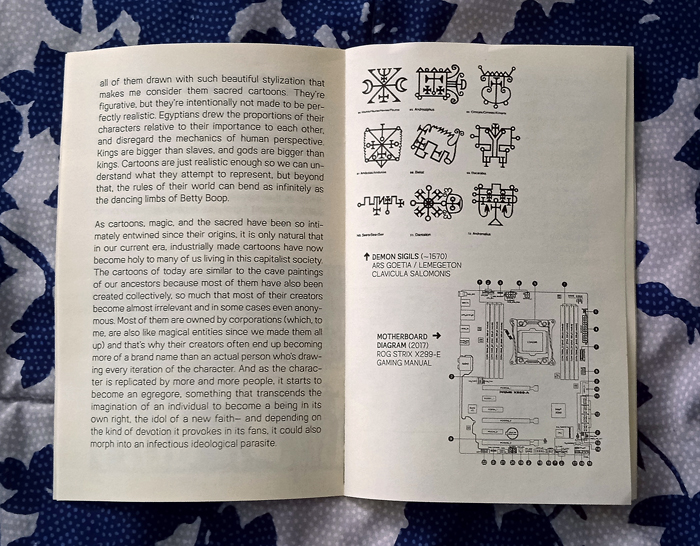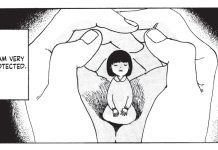 Cartoon Spirituality
Cartoon Spirituality
Written by Inés Estrada
Illustrations and collage by Inés Estrada
Published by Gatosaurio
What is a cartoon? What is magic? What is this power we have, and who are we giving it to? In Cartoon Spirituality, Inés Estrada (aka Inechi) uses easy, inclusive language to capture the pop culture zeitgeist of love and anxiety, fandom devotion and the power of worship. Cartoon Spirituality is from and about our digital world, available via it, but definitely a zine. Inechi is a pamphleteer and Cartoon Spirituality arrives by post.
It is a zine about art and magic being the same thing. Drawing is an act bringing something into the world that wasn’t a part of it; once artist makes art real, it is a part of the world, capable of creating more art. Inechi makes it clear that when she’s talking about a cartoonist drawing, she’s using a catch-all concept for creating any kind of art, and the zine is providing a starting place for the conversation. All storytelling on the page is cartooning because, comics or prose, writing is making marks is drawing. Everything is art. Everything is magic. That said, the concern of the zine isn’t an inquiry into the act of making magic; it’s focused on the world our magic shapes, the intersection of the industry and the scene.
Cartoon Spirituality exists in the space where cartoons live after being created, the life of its own that takes on different meanings for different people — a place where definitions collide. One of the laws of communication is receivers negotiate meaning. I like it, it doesn’t change the content of the message, but accounts for how different audiences respond. Inechi is inspecting art’s influence on the architecture of what is, like when a folktale being retold incorporates new cultural impressions but with Digimon instead of Beauty and the Beast. Figures who stood for one thing can become effigies that contradict themselves, and back again. Inechi reconciles this idea with magic; we feed the ghost that lives within our collective story about it.
The anthropological argument that everything since Lascaux has been cartoons including the whole of language is great. Cartoon Spirituality moves from cave paintings (images with meaning) to the birth of languages as an evolution of image communication (early words that, when written, look like the thing they describe) to Betty Boop cartoons to illustrate the growing complexity that art is able to convey. The drive to create new stories with the characters and ideas we love is deeply tied to the self and genuine passion, a facet of human nature that goes back as far as we do, but its proximity to compulsion is also a source of worry when we’re investing in modern icons who are more sympathetic to industry than individual experience. Corporations are not people, no matter how we think of them, and yet they are anthropomorphized enough that they can use (our) magic (against us). If art is a story, Inechi questions who is talking, what are they saying, and if you believe in other possibilities or only the ones they’re offering.
When I say finger on the zeitgeist, I mean Cartoon Spirituality came out in mid-spring and Captain America and his peers were codified into the library of classic literature by Penguin at the start of the summer. Look, whether or not you want Captain America in your life is up to you, not anyone else. How you feel about a book should be something you can talk about, but discourse is a four-letter word, discussion when it’s been reduced to a binary debate whose amplification of extremes only leads to a flattening of differences, drawing lines between shared identities, and excluding nuance. Inechi sees this alienation of relation that’s contrary to individual experience as the result of trauma inflicted by capitalism. The solution to conflict being settled with purchasing power only serves the few. Seeing as capitalism perpetuates injustice in service to white supremacy, I think it’s more accurate to call it fascism. Everything polarized into either right or wrong serves fascists because they are the arbiters of morality, and obedience to their hierarchy is the only way to gain any agency.
And they aren’t listening. Cartoon Spirituality asks if it’s time to assess how much you want to keep giving them. Marian Wright Edelman’s observation that you can’t be what you can’t see is easy to picture in the immediate context of a world where only corporate fandoms flourish despite their failure to reflect the fans, and how would you know you can be something if it is never allowed the space to be depicted. I think what Inechi is talking about applies to the macrocosm, as well; if the corporation is selling you their story with the character (and it sure feels like they are), and the small solution is to choose a different character, it seems reasonable that there are narratives outside of capitalism we could be if we could see.
Lucy Parsons, an orator “more dangerous than a thousand rioters,” put it this way: “A long period of education must precede any great fundamental change in society, hence [anarchists believe]… in the development of self-thinking individuals. We look away from government for relief, because we know that force (legalized) invades the personal liberty of man, seizes upon the natural elements and intervenes between man and natural laws; from this exercise of force through governments flows nearly all the misery, poverty, crime and confusion existing in society.”
Cartoon Spirituality doesn’t have answers. I can’t really classify it as a call to action, as Inechi isn’t telling you how to live your life. It’s her articulating self-reflection; but no one can exclude themselves from the world. It’s an emotionally inclusive response to issues we tend to only approach logically, the latter almost always leading to arguments and deadlock that the former is free from. A perspective with the flexibility to suit individual cases. But! Her criticism of the intertwined relationship between icons, the egregores they spawn, and capitalism does make a strong argument for choosing anarchism instead of compulsory compliance, and doing it via micropress.
Zine format is perfect for this particular essay. The illustrations and collages are inspired. They are functional, informative, at times directly supplementing the text, with other examples putting indirect wrinkles in the read. The line in the art between what was created for the zine by Inechi and what was found and documented does not exist, a seamless interweaving that short circuits explanation so that aesthetic can get turned up to eleven. The drawings- look at that cover!- embody multiple aesthetics at the same time. The real world pulls are giggle fits of ridiculous bliss like the ten foot tall Tokidoki Kittypatra statue slid between sacred calligraphy and Vivienne Westwood. But who is responsible for the Rilakkuma Buddha? Found, made, it’s all art, it’s all magic.
I don’t think you’d be able to just vibe in a peer reviewed journal, but there’s some inexplicable Bugs Bunny in residence stuff in Cartoon Spirituality that doesn’t directly add to the idea so much as the mood, and the zine would be lesser if it was left out. Ironically the deregulated nature of the zine scene allows Inechi an interdisciplinary approach that typical academic writing is too specialized to be capable of, despite being thought of as superior to armchair investigations like Cartoon Spirituality. I’m not saying vibes give bullshit a pass. I am saying that an author’s transparency in what they know and are saying means more to me than the stature of an academic institution. Inechi takes the time to be clear about what exactly she is saying and why she is saying it, and although she is attempting with Cartoon Spirituality to define meaning, it is inclusive instead of exclusive: Inechi isn’t setting up blockades to keep what art isn’t allowed to be out, she is asserting what it is.
That said, the pamphleteer side of zines is present in this book, the same contemplative nature that reveals the cartoon face of god cannot ignore the world from which we observe it. Cartoon Spirituality is written by someone who is already engaged in the work of liberation addressing her peers, not a teacher and student with a transaction of knowledge, but something that recognizes understanding as a fixed point that the process of making art helps both artist and audience move closer toward. The fire inside you is yours to tend, how bright you believe tomorrow is capable of being.
“Who are you investing in” is a tricky angle to approach the sentiment that we should be leaving transactions behind. Voting with your dollar is playing a game you can’t win, and to be honest this zine is about much more than money representing how you invest in things. But it certainly addresses the need for real change now. Making an alternate purchase instead isn’t strictly speaking activism against capitalism, but it’s a start to taking an aspect of their power away from them. Coincidentally, if you are interested in supporting the arts but wish to divest what’s put into corporations so that it goes to artists instead, Cartoon Spirituality is the tip of the Gatosaurio iceberg.
Gatosaurio is a combo micropress and distro based out of Mexico City, started by Inechi and run by her and Valis Ortiz. Cartoon Spirituality is from my second time doing a Gatosaurio mail-order. She distributes a ton of cool shit, her stuff and work from lots of other artists, apparel, surprises. Inechi’s collection of short comics Impatience is today’s Dirty Plotte, an alternative comix release from the not-cursed timeline that somehow made it into ours. There’s also a ton of excellent, crazy pornography on there. The pop culture stoner skater silkscreened stickers from Rex Bantron are out of this world. There’s a hefty, fascinating art history book co-edited by Inechi on the Mexican punk zine underground. Like I said, zines and peer reviewed journals.
Gatosaurio is walking the walk to Cartoon Spirituality talking the talk, Inechi is advising you to take a look at the broader world and all its unique artists and then Estrada (and Ortiz) offer you a way to support a bunch of them. Cartoon Spirituality is a trip, a spark, an ideal worth pursuing.
Cartoon Spirituality is available to mail-order from Gatosaurio


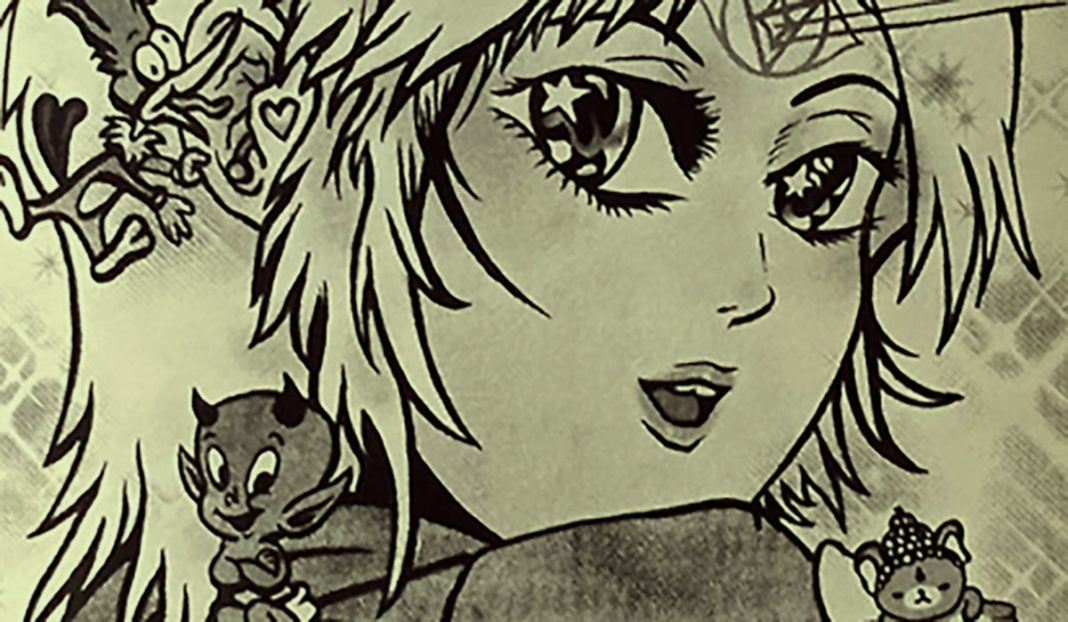
 Cartoon Spirituality
Cartoon Spirituality